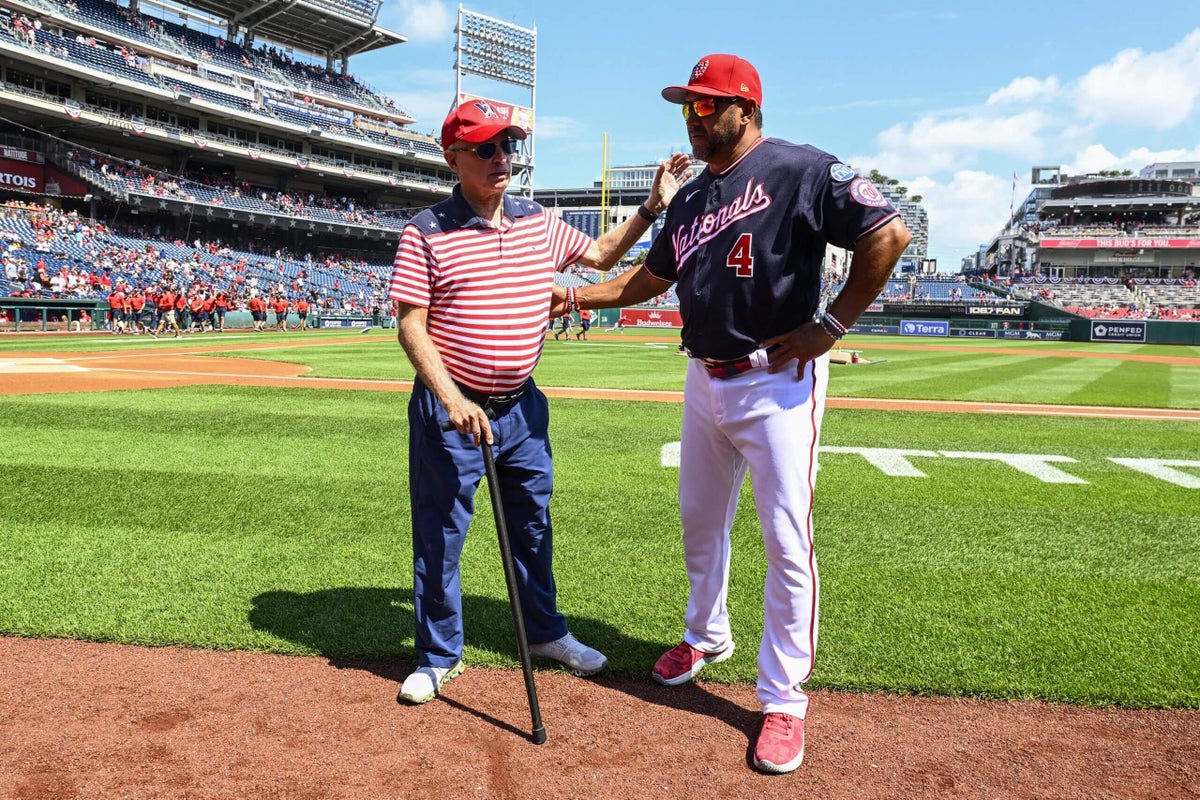There’s a theory in the immediate aftermath of the firings of president of baseball operations Mike Rizzo and manager Davey Martinez that in saving the approximately $8 million on both men’s combined 2026 club option years, perhaps the Washington Nationals ownership group is clearing the books as best they can to prepare for a sale.
That seems unlikely.
While the Lerner family — the majority owner of the franchise — explored a sale briefly in April 2022, Mark Lerner told the Washington Post this spring that the news was overblown and “unless something different happens along the way, we’re in it for the long haul.”
Sure, that tune could change quickly if someone comes up with $2.4 billion. But given the state of both baseball’s labor negotiations — many in the sport are bracing for the very likely possibility of a lockout after the 2026 season — and the uncertainty of the sport’s television rights, the Lerners would be selling low. And selling low is exactly what they didn’t want to do three years ago, when the family was reportedly seeking a figure in the vicinity of the $2.4 billion Steve Cohen paid for the New York Mets in 2020. (For reference on how lofty that valuation may be for the Nationals, the Baltimore Orioles sold for $1.725 billion just last year.)
Ted Leonsis, who owns the Washington Capitals and Wizards, has shown previous interest in owning the Nationals, offering north of $2 billion at one point. He remains interested in buying the team, according to industry sources, and in airing their games on his Monumental Sports Network.
The Nationals, who until last week were the only team without both a jersey patch and stadium naming sponsor, have a revenue problem. Outside of the Rockies, no one has lost more games than the Nats since they won their World Series title in 2019. Attendance is down. Corporate sponsorships have lagged, too. And while the jersey patch helps, the team has gone years without a sponsor for Nationals Park, leaving tens of millions on the table. So while saving $8 million on Rizzo and Martinez is nice, it’s a drop in the bucket when trying to prop up a team’s valuation.
After years of being paid what they deemed below-market value for their TV rights, the Nationals are entering their final season of being on the Orioles’ majority-owned channel, MASN (Mid-Atlantic Sports Network). As early as 2026, they can sell those TV rights to MLB, which may be the most likely solution. The Nationals were awarded around $320 million by MLB’s Revenue Sharing Decision committee for broadcast fees from 2022-26. Should they wait to sell for a few years, until 2028 or so, any labor tensions would presumably be gone. MLB’s media landscape, and how teams get paid from it, could look vastly different. So could the Nationals’ on-field product.
But that’s all years away. In the Nationals’ immediate future, the team will need to name permanent fixtures at general manager and manager. (You could make a case they could benefit from having a president — which was Rizzo’s title — as well as a GM, rather than one guy with both titles.) Interim general manager Mike DeBartolo — who told reporters Tuesday he wanted to ramp up the team’s technology and analytics — is a strong candidate to keep the role long-term, according to sources familiar with the team’s thinking. The Lerner family has never actually had to hire a GM in nearly 20 years of ownership, and they should still want to go through a formal interview process, even if just to gauge interest and new ideas from those outside the Nationals organization. Good people will be interested in the job regardless of ownership’s reputation. There are, after all, only 30 jobs to lead an organization. The Lerner family declined to comment through a team spokesperson.
In replacing Martinez, who was a first-time manager, it’s unlikely the Lerners will want to bankroll an expensive veteran manager, particularly in 2026 as the sport’s potential lockout looms. Not only would most experienced, big-name managers likely want a guaranteed multi-year deal, their salary demands would be much higher than those of a first-time manager, who may be convinced to take a one-year deal with an option. Let’s not forget the 2015 Bud Black fiasco when contract negotiations stalled, resulting in the Lerners hiring Dusty Baker. This ownership group has never been inclined to pay top dollar for their managers.
Perhaps that’s OK. The Nationals, who have appointed bench coach Miguel Cairo as interim manager, are not built to win now or next year. They could also promote from within for the manager job, though like GM/president, they would greatly benefit from at least canvassing the sport first. Longtime Triple-A manager Matthew LeCroy is well-thought of and has a broad knowledge of the organization’s younger players.
The Lerners made a bold move in letting go of the two men who engineered the organization’s only World Series title just before the team is set to make the No. 1 pick in the draft and only weeks ahead of the trade deadline. But only the timing appears to be truly out of character.
Fans hoping that these moves signify a new, more spirited ownership group ready to get back to top 10 payrolls, or one motivated to let the team change hands shouldn’t hold their breath. Until the Lerner family proves otherwise, they don’t deserve the benefit of the doubt.
(Photo of Mark Lerner and Davey Martinez from 2023: Brad Mills / USA Today)
